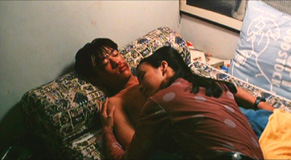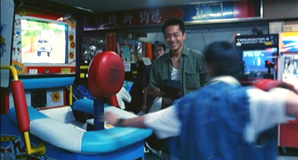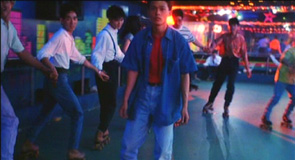Rebels of the Neon God (Tsai Ming-Liang, 1992)
 In Rebels of the Neon God, his remarkably strong
first full-length feature film, Taiwanese director Tsai Ming-Liang immediately
taps into the theme that has so far dominated his work. The subject at hand here
is the disconnected despair that results from urban decay. Using very little
camera movement and a good deal of humor, pathos, and rained out cityscapes, the
director crafts an enjoyable, fast-paced, but still poignant, look at modern
loneliness. In tracing the hijinks of three troublemaking teenage boys and the
people closest to them, the director creates a story that feels larger than it
might actually be. By repeatedly showing the young hoodlum Ah Bing as he trudges
out of the bed in his waterlogged apartment, Tsai establishes the repetitiveness
of the boys’ shiftless routines. By following them into video arcades, filled
with countless youth, obviously in the same state of mind, he presents their
condition as a national epidemic.
In Rebels of the Neon God, his remarkably strong
first full-length feature film, Taiwanese director Tsai Ming-Liang immediately
taps into the theme that has so far dominated his work. The subject at hand here
is the disconnected despair that results from urban decay. Using very little
camera movement and a good deal of humor, pathos, and rained out cityscapes, the
director crafts an enjoyable, fast-paced, but still poignant, look at modern
loneliness. In tracing the hijinks of three troublemaking teenage boys and the
people closest to them, the director creates a story that feels larger than it
might actually be. By repeatedly showing the young hoodlum Ah Bing as he trudges
out of the bed in his waterlogged apartment, Tsai establishes the repetitiveness
of the boys’ shiftless routines. By following them into video arcades, filled
with countless youth, obviously in the same state of mind, he presents their
condition as a national epidemic.
 Every facet of Rebels’ visual design seems to
exist solely to criticize the ugly overkill of metropolitan sprawl. Excess
signage, written in both Chinese and English for added visual impact, dominates
the Taipei streets to the extent that the buildings they hang on are barely
visible. Bike racks, classrooms, and roadways are all overcrowded jumbles of
activity. The video arcades and
roller rinks that serve as venues for enjoyment can only distinguish themselves
from the cacophony of the real world by cranking up the levels of the visual and
aural stimulants that they offer to even more unreal heights. Small hints of
traditional culture exist here and there, but since it is made to compete
against the flashy and new, it inevitably feels marginalized. The apartments
that supposedly offer refuge from all this are nondescript, functional husks,
devoid of much personality outside of one’s distinctive choice in television
programming. Perhaps worst of all, the unstoppable flooding that fills one
character’s floor on a nightly basis seems to suggest that the tide of the
outside world won’t even allow this space to exist without the tide of
external influence.
Every facet of Rebels’ visual design seems to
exist solely to criticize the ugly overkill of metropolitan sprawl. Excess
signage, written in both Chinese and English for added visual impact, dominates
the Taipei streets to the extent that the buildings they hang on are barely
visible. Bike racks, classrooms, and roadways are all overcrowded jumbles of
activity. The video arcades and
roller rinks that serve as venues for enjoyment can only distinguish themselves
from the cacophony of the real world by cranking up the levels of the visual and
aural stimulants that they offer to even more unreal heights. Small hints of
traditional culture exist here and there, but since it is made to compete
against the flashy and new, it inevitably feels marginalized. The apartments
that supposedly offer refuge from all this are nondescript, functional husks,
devoid of much personality outside of one’s distinctive choice in television
programming. Perhaps worst of all, the unstoppable flooding that fills one
character’s floor on a nightly basis seems to suggest that the tide of the
outside world won’t even allow this space to exist without the tide of
external influence.
 Rebels’ plot focuses most intently on the gradual,
inevitable social withdrawal of Hsaio Kang (played by nonprofessional actor Lee
Kang-sheng, who has appeared in each of Tsai’s subsequent features), a young
slacker who still lives with his discontented parents. Seemingly friendless at
the start of the film, he only recedes further into his insular world as the
movie progresses. Each attempt that he makes to reach out to another, whether
it’s his father, a peer, or a girl, is impeded, resulting in what feels like
his nearly total emotional isolation. By the time the film has built to its chilling
climax, it has presented in its main character a veritable plethora of
antisocial behavior. Because Tsai does such an excellent job of examining the
environment that Hsaio Kang lives in, however, his transgressions disturbingly
seem less the actions of a social deviant than of a person who is responding to
his surroundings in the way that his world has conditioned him to.
Rebels’ plot focuses most intently on the gradual,
inevitable social withdrawal of Hsaio Kang (played by nonprofessional actor Lee
Kang-sheng, who has appeared in each of Tsai’s subsequent features), a young
slacker who still lives with his discontented parents. Seemingly friendless at
the start of the film, he only recedes further into his insular world as the
movie progresses. Each attempt that he makes to reach out to another, whether
it’s his father, a peer, or a girl, is impeded, resulting in what feels like
his nearly total emotional isolation. By the time the film has built to its chilling
climax, it has presented in its main character a veritable plethora of
antisocial behavior. Because Tsai does such an excellent job of examining the
environment that Hsaio Kang lives in, however, his transgressions disturbingly
seem less the actions of a social deviant than of a person who is responding to
his surroundings in the way that his world has conditioned him to.
* * * *
03-08-03
Jeremy Heilman